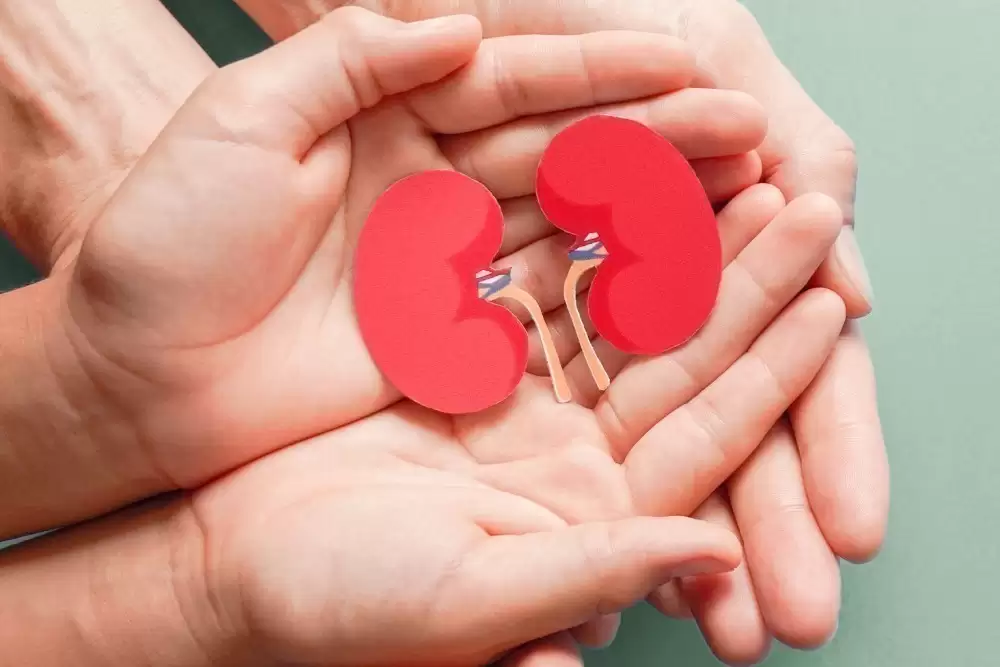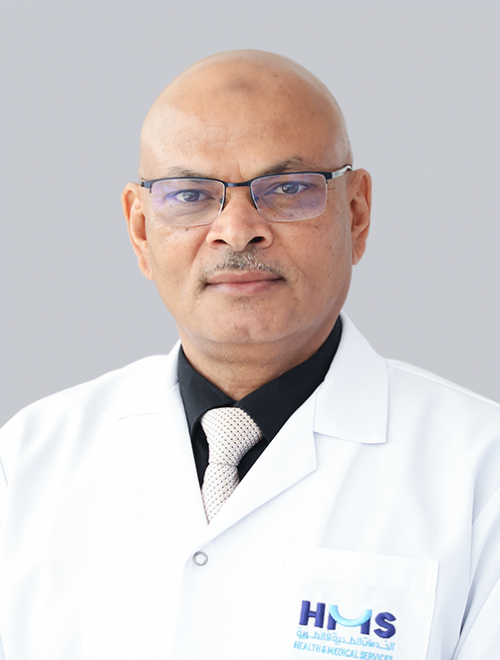Kidney Specialist in Dubai

What is Nephrology?
Nephrology is a branch of internal medicine that specializes in the treatment of kidney problems. At HMS Mirdif Hospital we have the best nephrologist in Dubai who specialised in all types of kidney diseases. Our Kidney Specialist in Dubai at HMS Group will diagnose and provide treatments for all kidney problems.
You have two kidneys in your body. They're on either side of your spine, underneath your ribs. The kidneys are responsible for several important tasks, including:
- Eliminating waste and extra fluid from the bloodstream.
- Maintaining electrolyte balance in the body.
- Releasing hormones that regulate blood pressure.
- Getting rid of toxins from the body
- Hormones are created to regulate blood pressure and focus on promoting bone health.
Chronic renal disease, kidney infections, and kidney failure are among the problems they treat. If you have a complex or advanced kidney condition that necessitates specialist care, your primary care doctor would most likely refer you to a nephrologist.
A nephrologist is a doctor who specializes in the treatment of kidney problems. Nephrologists are experts not only in disorders that affect the kidneys, but they're also well-versed in how renal disease or dysfunction can impact other regions of the body.
The Department of Nephrology at HMS Mirdif Hospital cares with a team of the best nephrologists in Dubai for patients with diseases and disorders of the kidney. Our mission is to improve the health of patients with all forms of acute and chronic kidney diseases and manage complex or advanced nephrologic disorders.
Many of the diseases that affect your kidney affect your entire body, as this needs to function properly. Our advanced kidney care is provided in a warm, friendly setting so you feel comfortable and relaxed during your treatments. Our Team of Specialists is here to help you manage your symptoms and improve your quality of life, you can rest easy knowing you’re in good hands.
Our Nephrology Department with the best nephrologists and kidney specialists focuses on the diagnosis and treatment of diseases of the kidney and because the kidney performs so many critical functions, our Medical team has expertise in primary kidney disorders, but also the management of the systemic consequences of kidney dysfunction.
Common Causes of Nephrology or Kidney Diseases
A variety of disorders, both medical and environmental, can impact negatively the kidneys. These disorders can cause structural and functional problems. The following are some of the signs and symptoms of renal disease or kidney disease:
- As a result of fluid retention, the ankles swell.
- Breathing problems
- Nausea
- Pain in the chest
- Drowsiness and fatigue
- Appetite loss.
- Blood pressure that is too high
- Urination patterns have shifted.
- Skin that is itchy
Common Kidney Disorders
Kidney diseases are divided into two categories: those that affect the kidneys and those that affect the body as a whole.
- Acute Kidney Diseases/Failure
When the kidneys suddenly stop working for a brief period, it is called acute renal disease or Acute kidney disease. This can last anywhere from a few hours to several weeks. The accumulation of toxins and electrolytes in the body due to a lack of blood filtration can be dangerous.
Diagnose Acute Kidney Diseases: Blood and urine tests are used to diagnose the disease.
Causes of Acute Kidney Diseases: Acute renal disease can be caused by a variety of factors, including:
- Clots in the blood
- Dehydration
- Failure of the liver
- Infection that occurs suddenly and is severe
- Kidney autoimmune diseases
- Loss of blood
- Toxicity caused by some drugs
- Urinary Tract Obstruction is a condition in which the urinary tract is obstructed
Treatment options for acute renal failure are indicated based on the underlying cause after a definitive diagnosis. The following are some of the therapeutic options for acute renal failure:
- Medication that regulates mineral levels in the blood
- Changing your diet to include less potassium and sodium
- Hemodialysis
- Chronic Kidney Disease (CKD)
Chronic kidney disease (CKD) is a condition in which your kidneys are damaged and unable to filter blood as effectively as they should. Chronic kidney disease, often known as chronic kidney failure, is the progressive decrease of kidney function over time. If the condition is not handled quickly, the patient may develop permanent renal failure that cannot be corrected.
Because of the few signs that chronic kidney disease exhibits, it might be misdiagnosed for a long time. It is only discovered after the symptoms have grown rather severe as a result of the impairment of renal functioning.
The risk factors for developing kidney disease are :
- Diabetes
- High blood pressure
- Heart disease
- Age
- Family history of kidney failure.
Chronic kidney disease is characterized by the following symptoms:
- Appetite loss
- Blood pressure is too high.
- Breathlessness
- Cramps in the muscles
- Foot and ankle swelling
- Insufficient urine output
- Itchy skin that persists
- Nausea
- Sleeping problems
- Tiredness
- Urine with blood in it
Diagnose Chronic Kidney Diseases: Blood and urine tests, imaging, and a biopsy are commonly used to diagnose chronic kidney disease.
Treatments for Chronic Kidney Diseases: Some types of kidney disease can be treated, depending on the underlying cause. Chronic kidney disease, on the other hand, is frequently incurable.
Treatment typically consists of measures to control signs and symptoms, reduce complications, and slow disease progression. If your kidneys are severely damaged, you may require end-stage kidney disease treatment.
Medical Conditions or Kidney Diseases cared for by Our Nephrology Department include:
- Primary kidney disorders such as glomerular diseases (such as glomerulonephritis or nephrotic syndrome),
- Tubulointerstitial kidney diseases,
- Tubular defects
- Toxins on the kidney, including various diagnostic and therapeutic agents.
- Kidney vasculature (such as renal artery stenosis)
- Infections and neoplasms of the kidney
- Abnormalities of the kidney, collecting system, and bladder (such as nephrolithiasis)
- Renal failure
- Chronic kidney disease
- Hematuria
- Proteinuria
- Kidney stones
- Hypertension
- Disorders of acid/base or electrolytes
Laboratory Tests & Procedures for the Kidney Disease Diagnosis:
Blood tests.
- Glomerular filtration rate (GFR): This test determines how effectively your kidneys filter your blood. GFR begins to go below normal values for kidney diseases.
- Creatinine in the blood: Creatinine is a waste product that is found in higher concentrations in the blood of persons who have kidney disease.
- Blood urea nitrogen (BUN): High amounts of this waste product in the blood, like creatinine, indicate renal failure.
Urine tests.
- Urinalysis: This urine sample can be examined for pH as well as abnormal quantities of blood, glucose, protein, or bacteria using a dipstick.
- The albumin-to-creatinine ratio is a measurement of how much albumin is present in (ACR). This pee test determines how much albumin protein is present in your urine. Kidney failure is indicated by the presence of albumin in the urine.
- Urine is collected every 24 hours. This approach collects all of your pee for 24 hours in a specific container. This sample can be subjected to additional testing.
- Clearance of creatinine. This is a creatinine measurement derived from a blood sample and a 24-hour urine sample, which is used to quantify the quantity of creatinine that has left the blood and gone to the urine.
We offer a range of treatments for kidney disease including:
- Kidney surgery
- Blood pressure Management
- Medications
- Nutrition




